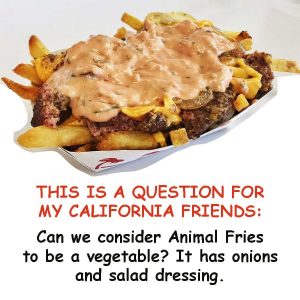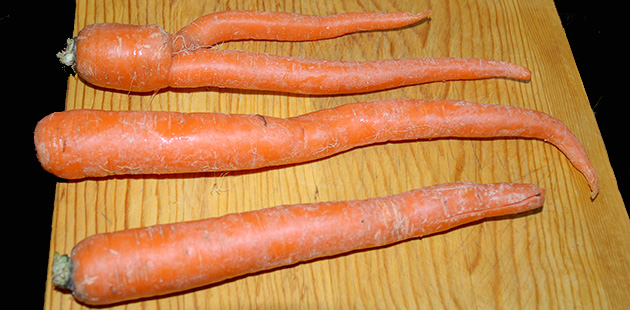Crooked Carrots and Other Dysfunctions
Top photo of carrots by Tim Forkes
Is your carrot crooked? I hope you don’t have two carrots growing out of … well … What the heck? And how did the eggplant become the emoji for a penis? Wouldn’t a cucumber be a better representation? Cucumbers can be straight or they can have slight curves. But a crooked carrot?
Some of us, of course, are traumatized by baby carrots.
What got me started on this was seeing all the TV commercials for pharmaceutical remedies for these issues. I became alarmed after looking up erectile dysfunction and Peyronie’s Disease, which is the condition that causes one to have a crooked carrot. If I read the inference properly (which I probably haven’t) Peyronie’s Disease is caused by too much masturbation.
Don’t look up Peyronie’s Disease on Wikipedia. There are some scary pictures that don’t look like any crooked carrots.
Looking up erectile dysfunction we find out it goes unreported in 75% of all cases. You want to know why many of us men are impotent, or suffer from erectile dysfunction? We’re fat, out of shape. Kaput. Yeah, we let ourselves go and it screws with our blood flow. Chances are — more than likely — if you are a Type -2 Diabetic over the age of 50, you suffer from erectile dysfunction, or are impotent.
According to the National Institutes for Health, 79% of men with erectile dysfunction also have a BMI (Body Mass Index) of 25 kg/m2 or greater. Men with a BMI of 30 are 3 times more likely to suffer from ED. What that “kg/m2” represents is the weight, in kilograms, divided by the square of the height in meters. Anyway, if your BMI is 25 or higher, you are overweight. If it is 30 or higher you are officially obese and very susceptible to erectile dysfunction. You can calculate your BMI here.
This started out as something humorous, but the more I dug into it, and finding out there is a huge (pardon the pun) stigma attached to ED, coupled with the relatively new idea that we should be more accepting of people with body image issues, making jokes didn’t seem appropriate.
No, we shouldn’t make fun of fat people, overweight people, because they deserve our respect as well. But as a nation we suffer some of the greatest health issues because of our high rate of obesity. We eat too much of the fatty, carbohydrate-filled foods — and processed sugar — and get little or no physical activity.

Simply put: Men, if you suffer from ED, can’t get an erection, ask your doctor if losing weight would help remedy that problem. You might also find out you have Type-2 Diabetes and/or heart disease, both of which are contributing factors to ED.
Man, I love In-n-Out Burgers. Millions of people do. I recently joked about calling Animal Fries a vegetable because they have grilled onions and Thousand Island salad dressing. Well, one serving of Animal Fries (French fries covered in grilled onions, melted cheese and Thousand Island Dressing) has a whopping 54 grams of total carbohydrates, 18 grams of fat and 395 calories. You also get seven grams of protein. Add on a Double-Double (double cheese burger) with grilled onions and we get another 670 calories and 18 grams of saturated fat. And the sodium (salt) is an eye-popping 1440 mg.
Am I going to stop hitting the drive-thru at my nearest In-n-Out? No. If I stop going through the In-n-Out drive-thru it will be due to the effin’ line. Anyone who has been to an In-n-Out knows how long the lines are and how crowded the dining areas. And the drive-thru line is the longest. But it’s worth it if you like burgers and them animal fries. So it is unlikely I will cut out In-n-Out altogether.

Let’s not pick on In-n-Out Burgers. Every fast food place with a drive-thru will have similar numbers when it comes to less than healthy food. In-n-Out is just an example. Check out their nutritional facts here, and those of McDonald’s. Popeye’s chicken and Subway sandwiches, to name just a few popular fast food joints in this household.
It’s not just fast food, although our collective penchant for drive-thru windows is killing us. Nearly every restaurant has very unhealthy offerings. Fried food, with lots and lots of carbohydrates. Then there is all that processed food in the grocery stores.
Exercise alone isn’t going to do it and let’s be honest, some of us need more than a vigorous 1-hour walk three times a week. Seriously, look in the mirror and ask yourself if the minimum suggested physical activity will be good enough for you. Certainly in my case it just won’t do.
The most significant change to lower my weight and BMI is a change in diet — which is much easier said than done. Compare it to quitting tobacco (which I have done) and multiply it by 10. That’s how hard it is to change my diet.
In the past 10 months I’ve lost over 35 pounds. I was hoping it would have been closer to 60 pounds because of the level of my obesity. My BMI for instance is 31.6. That’s after losing the weight. Just for the record I’ve had doctors and dieticians tell me I should lose the excess weight faster than normally suggested because of the rick factors and current health problems.
The big issue is: changing the diet is not a “one and done” adjustment. It requires daily discipline, a resolve to pass by the usual food offerings, including that fine French bread some of the grocery stores bake ever day. It requires the discipline to pick up the new habits of eating healthier after we slip into our old routines and habits. I’m not talking about eating “healthy” like those Instagram trainers/influencers, just healthier than what we’ve been doing all our lives.
Let’s not forget this is the holiday season when food is a part of everything. It’s hard, but we can do it. Let’s not get angry at ourselves for eating all that great food this holiday season. We can always get back to eating healthier.
The financial cost of treating adult obesity is estimated to be between $147 billion per year to $210 billion per year. We could significantly reduce our health care costs and improve our health care outcomes just by losing weight and living healthier lifestyles — which means fewer trips through the In-n-Out drive-thru.
For men, it could be a part of the remedy for getting boners again. Maybe you don’t need those pills, but consult your doctor. Don’t rely on what you read on the world wide web.
It’s no joke.

Tim Forkes started as a writer on a small alternative newspaper in Milwaukee called the Crazy Shepherd. Writing about entertainment, he had the opportunity to speak with many people in show business, from the very famous to the people struggling to find an audience. In 1992 Tim moved to San Diego, CA and pursued other interests, but remained a freelance writer. Upon arrival in Southern California he was struck by how the elected government officials and business were so intertwined, far more so than he had witnessed in Wisconsin. His interest in entertainment began to wane and the business of politics took its place. He had always been interested in politics, his mother had been a Democratic Party official in Milwaukee, WI, so he sat down to dinner with many of Wisconsin’s greatest political names of the 20th Century: William Proxmire and Clem Zablocki chief among them. As a Marine Corps veteran, Tim has a great interest in veteran affairs, primarily as they relate to the men and women serving and their families. As far as Tim is concerned, the military-industrial complex has enough support. How the men and women who serve are treated is reprehensible, while in the military and especially once they become veterans. Tim would like to help change that.

